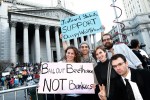Column Name
Title
As an occupier of Wall Street, I am privileged and thankful to hold a number of distinctions among the diverse community within Liberty Square. In addition to being employed by one of Lincoln Center’s esteemed performance organizations, I have also worked closely with the denizens of Wall Street: I was the executive director (for a brief term) of a well-known hedge fund manager’s nonprofit organization. These experiences, among many others, inform and energize my occupation of Wall Street. Given the wrathful nature of establishment hierarchy, perhaps it goes without saying that the personal perspectives expressed in this column are exactly that: my own.
Members of the Juilliard community were among the 20,000 protesters who marched through New York City’s Foley Square on October 5 as part of Occupy Wall Street. They are (from left to right): Historical Performance major Kristin Olson, Jazz Studies major Samora Pinderhughes, bassist Corey Gerstenfeld, orchestra manager Justin Brown, and pianist Benjamin Laude.
(Photo by Nan Melville)Body
I occupy Wall Street to participate in the uniquely American community of transformation that was born in Lower Manhattan on September 17, 2011. Modeled in part on the recent uprisings in Egypt, Spain, and Israel, the growing occupation movement extends the possibility of true democracy across the country and across the globe.
I occupy Wall Street to amplify the muted voices of Americans and to mute the amplified voices of corporate hegemony. Never before have such a small number of individuals and organizations controlled so much wealth and power. Accordingly, the occupation represents not a demand for the immediate redistribution of resources, but, rather, a hope for, and effort toward, greater balance.
I occupy Wall Street to engage in a citizen’s most important obligation: not to abide and obey, nor to depart for foreign lands, but to act and persuade in the interest of justice. Since the inception of the state, these options have remained unchanged. Now, more than ever, we must act in order to demand equal rights. As has been well said, justice is an aversion to doing injustice.
I occupy Wall Street because I have witnessed, firsthand, the greed and blindness of the economic leaders of our great nation. The charge of fiduciary duty represents, in truth, not only a legal relationship between two parties with respect to the management of money, but also an imperative and broadly-based ethical obligation. Any conception of good faith must exist in relation to considerations of sincerity, honesty, and equity.
I occupy Wall Street to fight for the freedom of the next generation of performing artists, and to ensure the integrity of their education. The suffocating influence of corporations, foundations, and wealthy individuals is not limited to the research departments of large universities; to be sure, an influx of cash earmarked in self-interest carries at its side the possibility for strangulation of the pedagogic priorities, prerogatives, and independence of arts education organizations of every size and variety.
I ask, simply, that you do the same. Another reason, more material and immediate, for my occupation—the liberation of artistic activism—is valorized by early and notable achievements of direct action. The dedication of the Occupy Wall Street movement to such performance-based engagement is clear: from the ever-present musical activities, spontaneous dance demonstrations, and dramatic productions to the establishment of performance and arts and culture working groups, there can be no doubt that aesthetic fire has fueled the occupation from its first spark. Online and offline, in the square and on the street, American art has unfastened its fetters, made an extraordinary escape from the museum, and claimed a place for itself on the revolutionary battleground.
In short, I occupy Wall Street because I’ve discovered the stage of metamorphosis on which Artists become Citizens. If the trillion-dollar War on Terror has taught the moneyed class little else, certainly they now know better than to pick a fight with those who have nothing left to lose. It seems, however, that the avaricious myopia of America’s financial elite has prevented them from learning both the violent and nonviolent lessons of recent history. Now there’s no turning back: let the battle for America’s future begin!





